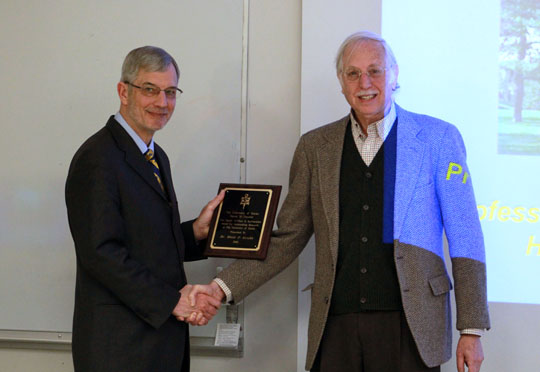Dr. Blair Grubb, director of UT Medical Center’s Cardiac Electrophysiology Program, has been named the 2015-2016 winner of the Dion D. Raftopoulos/Sigma Xi Award for Outstanding Research, an honor given by the University’s Sigma Xi chapter.
Dr. Steven Federman, professor in the Department of Physics and Astronomy and president of UT Sigma Xi, presented a plaque and cash award of $1,500 to Grubb Jan. 25 during a ceremony on Health Science Campus.

Dr. Steven Federman, right, shook hands with Dr. Blair Grubb after presenting him with the 2015-2016 Dion D. Raftopoulos/Sigma Xi Award for Outstanding Research.
“This award is presented to faculty who have made significant contributions in their fields of research,” Federman said. “Dr. Grubb’s accomplishments in the study of autonomic disorders while a professor at UT are truly impressive, and UT Sigma Xi is pleased to honor him.”
Internationally recognized as a pioneering researcher, Grubb identifies autonomics as a new field. His work has had a significant impact on the practice of medicine across the globe, and has improved the lives of hundreds of patients suffering from these disorders.
Grubb, who called his study of autonomic disorders his “life’s work,” discussed his research in a lecture titled “Autonomics: The Birth of a New Science” during the ceremony.
“When I began in this field,” Grubb said, “we knew virtually nothing about these disorders, and patients were often disabled and without hope. Over the last three decades, we have carefully characterized and classified these illnesses and established diagnostic criteria for them. Recently, we have embarked on an ambitious program to identify the molecular, genetic and immunologic causes of these disorders. In addition, we have used this information to discover a series of new and innovative therapies that can return close to 80 percent of these patients to near-normal lives.”
His patients, he added, routinely come to UTMC from around the world for treatment.
He added that he is humbled by the Sigma Xi award, noting that Sigma Xi’s national office has honored a number of Nobel laureates, including Albert Einstein and Al Gore. It is the most recent recognition for Grubb’s dedication to medical research and patient care. In 2016, he was the recipient of UT’s Career Achievement Award. The year before, he was named Dysautonomia International’s Physician of the Year, as well as the British Heart Rhythm Society and Arrhythmia Alliance’s Medical Professional of the Decade — one of the only non-British citizens to be so honored.
He has authored more than 240 scientific papers, five books and 35 book chapters during his career in medicine.
Also known for a creative prowess, Grubb has published more than 50 essays and poems, including a book titled “The Calling.”
Sigma Xi, the Scientific Research Honor Society, is a national organization that recognizes individuals who have made significant contributions to the advancement of scientific research and knowledge. A voiceover on the Sigma Xi website stated, “The honor of members is that we are a society of integrity… that we have been chosen and selected to represent science, that we are members of a society with Nobel laureates, and we carry a tradition more than 100 years old.”
The organization has 60,000 members worldwide. Chapters usually are found in universities, industrial facilities and government laboratories, as well as other locations where scientific research is conducted.
Grubb succeeds Dr. Yanfa Yan, professor in the Department of Physics and Astronomy, the 2014-2015 Sigma Xi awardee.